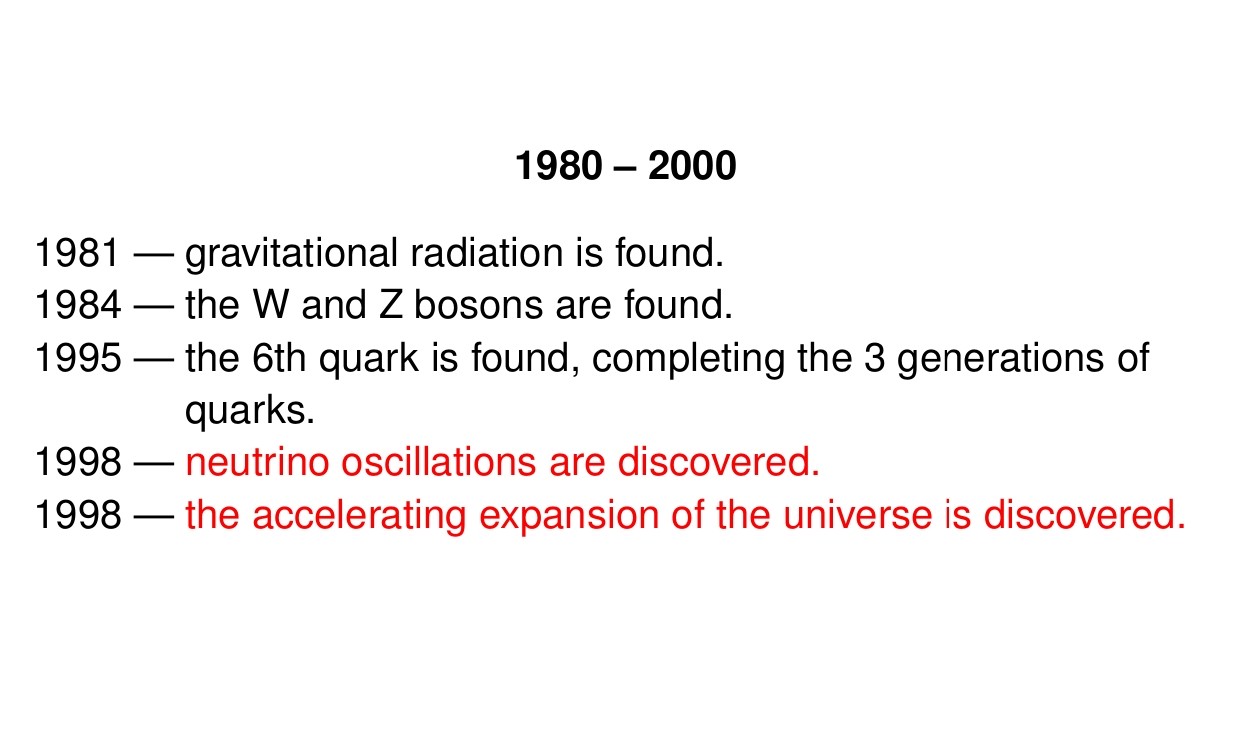John Carlos Baez on Nostr: The gusher of new fundamental physics slowed in 1980. Indeed, from this time on we ...
The gusher of new fundamental physics slowed in 1980.
Indeed, from this time on we don't see anything in yellow or green - that is, new experimental discoveries that by now are well understood theoretically, or new fundamental theories that have by now been confirmed by experiment. This is what I call the Great Stagnation.
Instead, what we see are confirmations of old theories, in black, and experimental surprises that we still don't fully understand, in red. Of course the red stuff is not necessarily bad! This is where we can hope for new progress. Most of it comes from astronomy.
I personally feel the new slightly tweaked Standard Model with Dirac masses for neutrinos will correctly account for how neutrinos "oscillate" - that is, switch back and forth between different kinds. But the jury is still out out on that.
The accelerating expansion of the universe came as a huge surprise back in 1998 when it was discovered by two independent teams, the Supernova Cosmology Project and the High-Z Supernova Search Team. By now we have lots more data on this, but people still argue about it a lot as each new experiment comes in. The simplest theory of accelerating expansion goes back to Einstein and DeSitter: a "cosmological constant" giving empty space a constant negative pressure and positive energy density. It's also called "dark energy".
But physicists can make up theories where the dark energy is getting stronger with time, or weaker. So some claim the acceleration is increasing, while others claim it's decreasing. You see lots of stories about this in the pop science news. Take them with a big grain of salt. Better experiments are coming.
(6/n)

Indeed, from this time on we don't see anything in yellow or green - that is, new experimental discoveries that by now are well understood theoretically, or new fundamental theories that have by now been confirmed by experiment. This is what I call the Great Stagnation.
Instead, what we see are confirmations of old theories, in black, and experimental surprises that we still don't fully understand, in red. Of course the red stuff is not necessarily bad! This is where we can hope for new progress. Most of it comes from astronomy.
I personally feel the new slightly tweaked Standard Model with Dirac masses for neutrinos will correctly account for how neutrinos "oscillate" - that is, switch back and forth between different kinds. But the jury is still out out on that.
The accelerating expansion of the universe came as a huge surprise back in 1998 when it was discovered by two independent teams, the Supernova Cosmology Project and the High-Z Supernova Search Team. By now we have lots more data on this, but people still argue about it a lot as each new experiment comes in. The simplest theory of accelerating expansion goes back to Einstein and DeSitter: a "cosmological constant" giving empty space a constant negative pressure and positive energy density. It's also called "dark energy".
But physicists can make up theories where the dark energy is getting stronger with time, or weaker. So some claim the acceleration is increasing, while others claim it's decreasing. You see lots of stories about this in the pop science news. Take them with a big grain of salt. Better experiments are coming.
(6/n)
